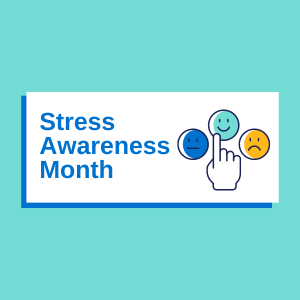
Higher assistant psychologist Hannah Sumiga shares her advice for understanding and managing stress:
Let’s talk about stress!
Working for the NHS involves dedicating our lives to helping others, and this can have a psychological, physical, and emotional impact on our wellbeing. The reality is that workplace stress is only one source of stress we NHS workers experience. Unless you’re living under a rock or are super-human, it’s likely you’re exposed to many other sources of stress in your everyday life, whether it be a relationship breakdown, a difficult financial situation, or the loss of a loved one.
Quite often, a natural response is to avoid the stress or pretend it’s not there and just ‘get on with it’.
Many of us feel, due to the nature of our roles, we’ve got to be the ‘strong one’, and we hold a false belief that struggling is a sign of weakness or indicates that we aren’t fit to be in our roles. However, it’s important to recognise that we’re not robots – we are human, and experience human emotions like everyone else. If we continue to avoid and ignore the stress, it will keep coming back. This why stress must be managed. Think of it like constantly running your car engine, you’ll end up needing more fuel or you’ll end up damaging your engine. If you’re constantly running on overdrive and are not maintaining your stress levels, like a car, something will eventually give.
A good thing to note is that stress is not always bad. A little stress can motivate us to do things. For example, being stressed for a job interview might give us that little adrenaline rush to prepare for it. In fact, it has been found that minor stressors stimulate brain chemicals and strengthen connections between neurons in the brain, thereby improving brain performance. Therefore, if we weren’t stressed about things, we would be totally inactive, demotivated and probably wouldn’t be able to meet our daily challenges. On the other end of the spectrum, too much stress can be detrimental to both our physical and mental health. That’s why a healthy optimum is important.
How do we know we’re experiencing too much stress?
A simple tuning into your body can help you recognise some signs and symptoms of too much stress. Can you relate to any of the below?

Managing too much stress in a healthier way
Creating a stress toolkit for when stress levels rise will give you some power over the stress and not let it get the better of you. Even though we might feel there’s no way out when stress becomes too much, simply increasing our problem-focused coping skills and emotion-focused coping skills can help you lift that weight off your shoulders.
If some of the stress can be changed, it’s important we use our problem-focused coping skills to tackle the stress head on. For example, if you’ve got lots of meetings at work and not enough time to prepare for them, delegating tasks to colleagues, asking for the meetings to be changed and organising your time can help reduce the stress. If you’ve come across a practical issue, such as not being able to pay a bill on time, you can problem-solve by brain-storming possible solutions, choosing the best solution, and implementing it.
When we have no control over the stress and we’ve used up all our problem-focused coping strategies, this is where our emotion-focused coping strategies are essential. Ever sat worrying about things you can’t control? We can’t directly control or change certain things, so by thinking about it more, we’re simply adding to our stress rather than reducing it.
What we can change, is our emotional response to this stressor. The best way to do this is to do something enjoyable; something that is meaningful to you and gives you a sense of connectedness to the outside world. Perhaps questioning what you value in life, what makes you feel good, what makes you feel relaxed, content, and happy. Why not go on a walk, spend some time with your friends and family, and say yes to those plans at the weekend that you keep saying no to! Changing your emotional response to a stressor can make you feel more emotionally resilient, will help you let go of strong negative emotions, and most importantly will not let stress pervade your life!
